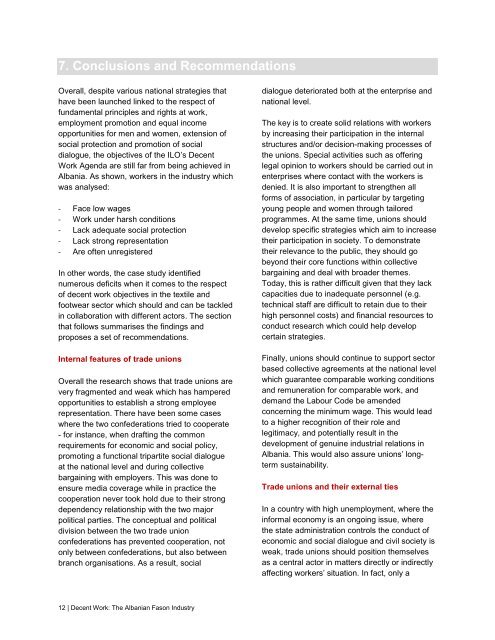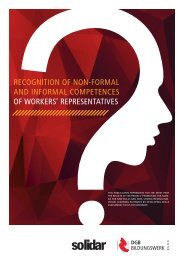The Albanian Fason Industry - Solidar
The Albanian Fason Industry - Solidar
The Albanian Fason Industry - Solidar
Create successful ePaper yourself
Turn your PDF publications into a flip-book with our unique Google optimized e-Paper software.
7. Conclusions and Recommendations<br />
Overall, despite various national strategies that<br />
have been launched linked to the respect of<br />
fundamental principles and rights at work,<br />
employment promotion and equal income<br />
opportunities for men and women, extension of<br />
social protection and promotion of social<br />
dialogue, the objectives of the ILO’s Decent<br />
Work Agenda are still far from being achieved in<br />
Albania. As shown, workers in the industry which<br />
was analysed:<br />
- Face low wages<br />
- Work under harsh conditions<br />
- Lack adequate social protection<br />
- Lack strong representation<br />
- Are often unregistered<br />
In other words, the case study identified<br />
numerous deficits when it comes to the respect<br />
of decent work objectives in the textile and<br />
footwear sector which should and can be tackled<br />
in collaboration with different actors. <strong>The</strong> section<br />
that follows summarises the findings and<br />
proposes a set of recommendations.<br />
Internal features of trade unions<br />
Overall the research shows that trade unions are<br />
very fragmented and weak which has hampered<br />
opportunities to establish a strong employee<br />
representation. <strong>The</strong>re have been some cases<br />
where the two confederations tried to cooperate<br />
- for instance, when drafting the common<br />
requirements for economic and social policy,<br />
promoting a functional tripartite social dialogue<br />
at the national level and during collective<br />
bargaining with employers. This was done to<br />
ensure media coverage while in practice the<br />
cooperation never took hold due to their strong<br />
dependency relationship with the two major<br />
political parties. <strong>The</strong> conceptual and political<br />
division between the two trade union<br />
confederations has prevented cooperation, not<br />
only between confederations, but also between<br />
branch organisations. As a result, social<br />
dialogue deteriorated both at the enterprise and<br />
national level.<br />
<strong>The</strong> key is to create solid relations with workers<br />
by increasing their participation in the internal<br />
structures and/or decision-making processes of<br />
the unions. Special activities such as offering<br />
legal opinion to workers should be carried out in<br />
enterprises where contact with the workers is<br />
denied. It is also important to strengthen all<br />
forms of association, in particular by targeting<br />
young people and women through tailored<br />
programmes. At the same time, unions should<br />
develop specific strategies which aim to increase<br />
their participation in society. To demonstrate<br />
their relevance to the public, they should go<br />
beyond their core functions within collective<br />
bargaining and deal with broader themes.<br />
Today, this is rather difficult given that they lack<br />
capacities due to inadequate personnel (e.g.<br />
technical staff are difficult to retain due to their<br />
high personnel costs) and financial resources to<br />
conduct research which could help develop<br />
certain strategies.<br />
Finally, unions should continue to support sector<br />
based collective agreements at the national level<br />
which guarantee comparable working conditions<br />
and remuneration for comparable work, and<br />
demand the Labour Code be amended<br />
concerning the minimum wage. This would lead<br />
to a higher recognition of their role and<br />
legitimacy, and potentially result in the<br />
development of genuine industrial relations in<br />
Albania. This would also assure unions’ longterm<br />
sustainability.<br />
Trade unions and their external ties<br />
In a country with high unemployment, where the<br />
informal economy is an ongoing issue, where<br />
the state administration controls the conduct of<br />
economic and social dialogue and civil society is<br />
weak, trade unions should position themselves<br />
as a central actor in matters directly or indirectly<br />
affecting workers’ situation. In fact, only a<br />
12 | Decent Work: <strong>The</strong> <strong>Albanian</strong> <strong>Fason</strong> <strong>Industry</strong>
















